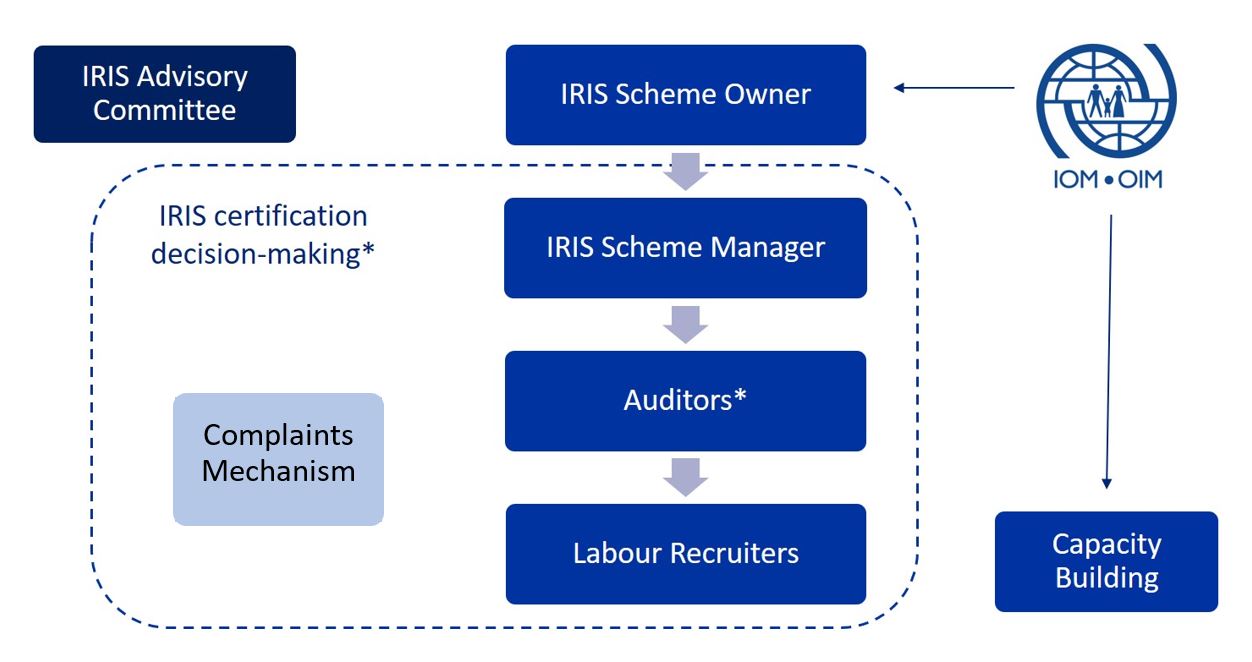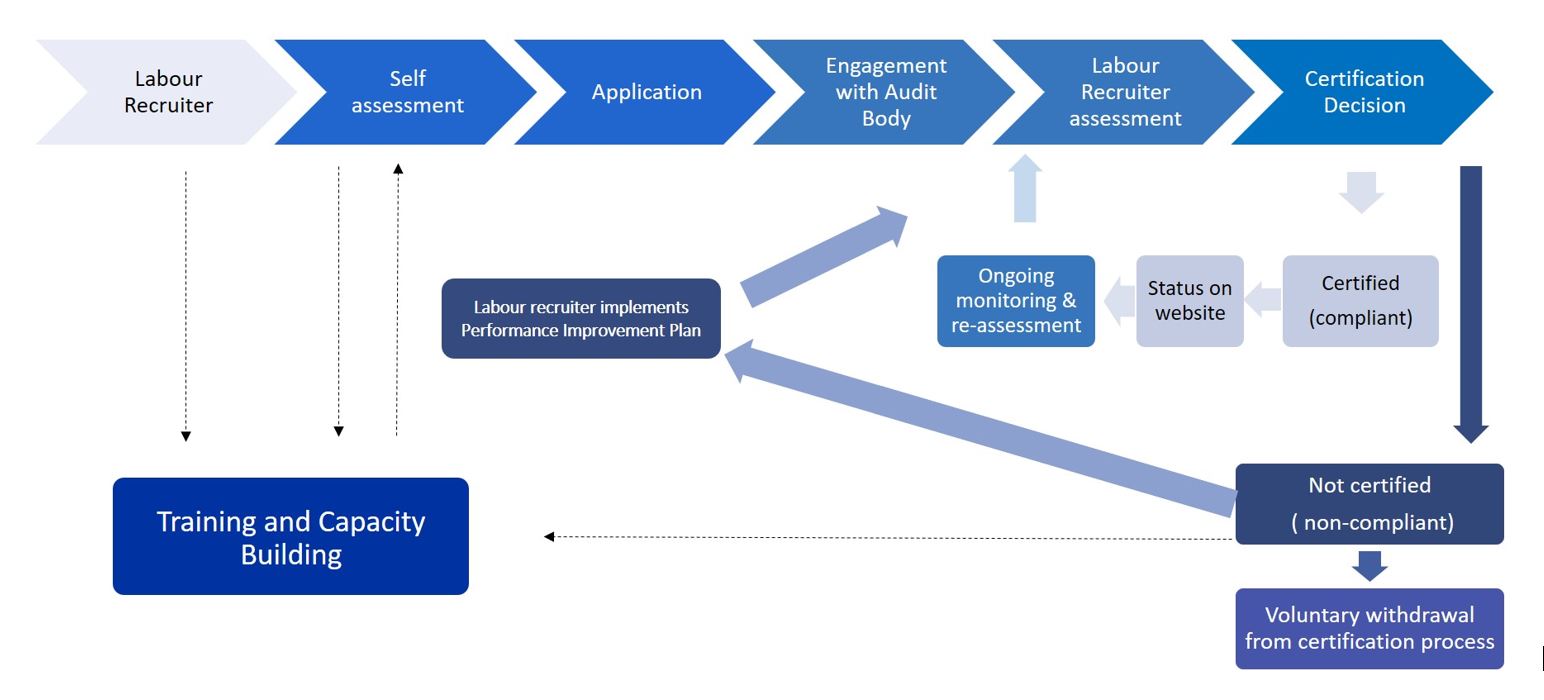IRIS Voluntary Certification Scheme
How does IRIS Certification work?
IRIS (International Recruitment Integrity System) Certification is voluntary and applies only to private recruitment agencies operating legally within the recruitment industry. To become a ‘certified IRIS labour recruiter,’ applicants (recruiters) need to demonstrate that their management system complies with the IRIS Standard. A management system is a framework that sets out how an organization (ie recruiter) will carry out its business to ensure it meets its objectives (ie complying with the IRIS Standard). It typically involves five elements: (1) Policies, procedures and processes, (2) Communication, (3) Skills and Training, (4) Monitoring and (5) Governance and Continuous Improvement.
The IRIS certification model is based on similar global certification schemes and includes a series of checks and balances to ensure the scheme is credible and robust.
IRIS Certification Model

Under this model, there are clearly defined roles for each of the stakeholders:
IOM performs the role of ‘Scheme Owner’ and is responsible for developing the IRIS Standard, advocating for ethical recruitment, capacity building and stakeholder engagement. It is important to note that IOM is not involved in the decision-making process for certification. This allows IOM to deliver capacity building programmes without conflicts of interest and reflects the fact that certification is beyond IOM’s mandate and expertise.
A separate entity performs the role of IRIS ‘Scheme Manager’ and is responsible for managing and supervising the IRIS certification process. The Scheme Manager is appointed by IOM.
The audit of the recruiters is conducted by independent third-party auditors who are trained and accredited by the IRIS Scheme Manager in coordination with the Scheme Owner (IOM). The auditors are ultimately responsible for making the decision about IRIS Certification.
A key element of the IRIS Certification model is the compliance and monitoring framework. The framework is both complaints-driven and occurs through periodical surveillance and re‑certification audits. This framework is implemented in partnership with civil society, relevant authorities and private sector partners.
How do recruiters apply for IRIS Certification?

Recruiters can apply for IRIS Certification through the IRIS Certification website. The process begins with the recruiter completing the IRIS Self-Assessment Questionnaire to determine if they are ready for IRIS Certification. If yes, the recruiter can submit their application via the website. If not, the recruiter may wish to undertake further training or drop out of the process.
When the recruiter (applicant) lodges their application, they will be prompted to select an IRIS approved auditor from the website. The recruiter will be asked to provide the necessary information on business practices to the auditor for their review. Together, the recruiter and the auditor will develop a joint certification plan, which will be submitted to the IRIS Scheme Manager for approval. Once approved by the Scheme Manager, the audit process can start.
What does an IRIS audit look like in practice?
An IRIS audit typically occurs in two stages. During the first phase, the auditor will carry out a desk review of the recruiters’ business practices. The auditor will ask for supporting documents such as company policies, standard operating procedures, contracts, job advertisements etc.
The second phase occurs ‘on-site’ and will involve interviews with the recruiter, workers and business partners. The auditor will be looking to verify that a management system is in place and is being followed.
The audit will be conducted using IRIS tools – including the IRIS Standard and auditing framework to verify compliance with the IRIS Principles.
When the audit is complete the auditor will make their recommendation for/against IRIS Certification.
Is IRIS Certification pass/fail?
No, there are five possible certification outcomes for recruiters:
- Leading (IRIS Certification): The recruiter is complying with all IRIS Principles and is considered in the top tier of recruiters.
- Performing (IRIS Certification): The recruiter is complying with all the IRIS Principles but there is still some room for improvement.
- Developing (No certification): While the recruiter is not ready for certification, there are no critical issues and the recruiter has demonstrated their potential for future certification.
- No Rating (No certification): The recruiter is breaching one or more IRIS Principles (ie there is evidence that workers are paying fees for their jobs).
- Alert (No certification): The auditor has uncovered serious recruitment and/or human rights breaches, such as evidence of forced labour.
Recruiters who have been certified will have the option of being included in a publicly available list of ‘IRIS certified labour recruiters.’ This can help recruiters increase their market visibility and attract new clients and workers.
How long does IRIS Certification last?
For a recruiter to be certified for the first time, they need to go through the two-stage audit process (as described above). Following the initial certification decision, the recruiter undergoes two surveillance audits after 6 and 12 months. Surveillance audits are considered ‘lighter’ audits. After two years, the recruiter needs to go through the two-stage audit process again to be re-certified. When a recruiter has been certified for the second time, only one surveillance audit needs to be conducted after 12 months.
How much does IRIS Certification cost?
There is no fixed flat rates as each recruiters’ business is different and costs vary between countries. The IRIS Scheme Manager is responsible for ensuring that the auditors are not over-charging recruiters for the audits. It is likely that the initial IRIS audits will be subsidized.